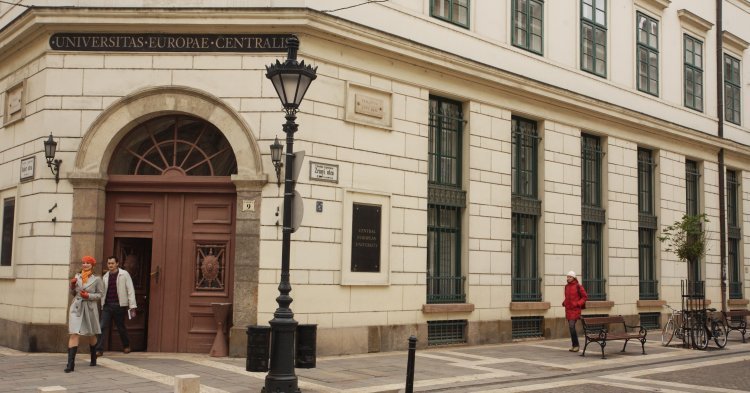The Hungarian government carries on with its attacks against the Central European University (CEU) based in Budapest, and seems ready to do anything to drive the academic institution into exile. The government refuses to sign the authorisation which would allow the University to teach in the country. A presentation of the logical (although scandalous) developments of a series of attacks against the University, and more precisely its founder George Soros who has been established as Viktor Orbán’s main enemy.
A forced exile, orchestrated by the Hungarian government
The Central European University embodies everything that Viktor Orbán, the Hungarian Prime Minister, rejects and criticizes. In short, the CEU is at the opposite of his nationalist and ultraconservative ideas. The University was founded in 1991, in the context of the fall of the USSR, with the mission to promote values of democracy and open society. Every year, the CEU in Budapest welcomes some 1,500 students of all nationalities (around 40% of the students are Hungarian, 60% of other nationalities) and offers courses in economics, law, political science, history and mathematics.
Through the CEU, the American-Hungarian billionaire George Soros is targeted by the government. Founder and patron of the University, George Soros has been the target of numerous attacks, to the point that a law was named after him, the “Stop Soros” legislation, which targeted his Open Society Foundations, eventually forced to move to Berlin. George Soros advocates a more open and liberal society, at the opposite of Viktor Orbán’s conservatism.
In April 2017, the Hungarian government passed a law establishing that any foreign university must have a campus in its country of origin. This was not the case of the Central European University: its headquarters are in New York, but its campus, renowned worldwide, is situated in the Hungarian capital, Budapest. The objective is clear: forcing the University to leave the country. To achieve this, the government imposed an ultimatum to the CEU: it will be obliged to transfer its activity into another country if the government doesn’t sign its accreditation and thus deprives it of its right to teach on the territory.
This ultimate attack is a continuation of a series of threats against the University, and this forced exile is nothing else but a new illustration of the numerous infringements to individual freedoms and citizen rights, which are more and more flouted and restrained in Hungary today. Here, academic freedom and autonomy are hindered by the Hungarian government.
On 22 November, in a letter addressed to the Hungarian Foreign Minister Péter Szijjártó, the president and rector of the University, Michael Ignatieff, gave a lesson in law to the government. He recalled that, according to the Hungarian law on higher education, “the authorities competent to decide whether a foreign institution is conducting educational activities in its home state are the educational authorities of that state”, and not the government itself. As such, it is up to the New York State Department of Education to judge if the academic institution conducts educational activities on its territory, and not to the Hungarian government to assess that it’s not the case.
Michael Ignatieff continued: “The question of whether CEU has complied with the law should be determined by the terms of the law itself. If you choose to ignore the terms of your own legislation, the responsibility for that lies with you”. The rector recalled that, for a few months, the University has ensured compliance with the legislation to be able to remain in Hungary, by implementing educational activities at the Bard College (a higher education establishment of the State of New York). An umpteenth attempt to remind the Hungarian government that it has in fact no justification to deprive the University of its right to teach in Budapest. In vain.
A challenging of academic freedoms
Academic freedoms are defined in a 1997 UNESCO Recommendation as “the right, without constriction by prescribed doctrine, to freedom of teaching and discussion, freedom in carrying out research and disseminating and publishing the results thereof, freedom to express freely their opinion about the institution or system in which they work, freedom from institutional censorship and freedom to participate in professional or representative academic bodies”. There are thus four fundamental freedoms: freedom of teaching, freedom in carrying out research, internal freedom of expression, and external freedom of expression. These freedoms must form the foundation of any education system. In Hungary, they are challenged by the government.
Numerous protesters have been trying (in vain?) to defend these rights and liberties. On 24 November, between 2,000 and 3,000 people demonstrated in Budapest’s streets to support the University, demanding a “free university” in a “free country”. The CEU was conceived and built as a space for debate, a laboratory of democracy where critical mind and freedom of expression must prevail. Among the University’s values, multiculturalism and diversity are fundamental, and the Hungarian government has tried its hardest to challenge and contest these principles.
Obviously, reflecting the Hungarian government’s general politics characterised by a nationalist retreat and the promotion of an “illiberal democracy”, these attacks are going against the democratic values of the European Union, and its institutions should not turn a blind eye to such infringements. Yet, the CEU cannot find real support among the European institutions and their respective presidents. We are still waiting for European leaders’ condemnations of these threats and of the forced exile imposed to the CEU. During the last plenary session of the European Parliament, Guy Verhofstadt, leader of the ALDE, urged the European Union to answer and act, and called the European People’s Party, of which Fidesz (Viktor Orban’s party) is a member, to “put and end to his autocracy, instead of tolerating it”.
The hospitality of the Austrian capital
If the Hungarian government does not sign the accreditation which would allow the Central European University to carry on its educational activities in Hungary, the CEU will move part of its activities to Vienna. The Austrian capital declared being ready to host the academic institutions. The Austrian Chancellor, Sebastian Kurz, recently met the philanthropist Geroge Soros to finalise the move: the former Otto Wagner Hospital will host the University’s activities in its premises.
This support from Austria for the University can appear somewhat surprising, given that Sebastian Kurz and Viktor Orban agree on several points concerning the European project (reception of migrants, autonomy and sovereignty of the member states). Therefore, this move could create tensions with the Hungarian government.
The fate of the Central European University thus remains uncertain, but what is certain is that the exercise of critical thinking and the questioning of the government’s nationalist and populist policy are not to the taste of Viktor Orbán, the “dictator”, as Jean-Claude Juncker once jokingly called the Hungarian Prime Minister.





1. On 29 December 2018 at 15:27, by Stevan Harnad Replying to: Academic freedom flouted in Hungary
Replying to: Academic freedom flouted in Hungary
“Viktor Orbán, the ’dictator’, as Jean-Claude Juncker once jokingly called the Hungarian Prime Minister”
Juncker, the Jolly Joker. His levity reflects the EU’s gravity on this issue...
Shame.
Stevan Harnad Former External Member, Hungarian Academy of Sciences (resigned in protest, October 2016)
Follow the comments: |
|
